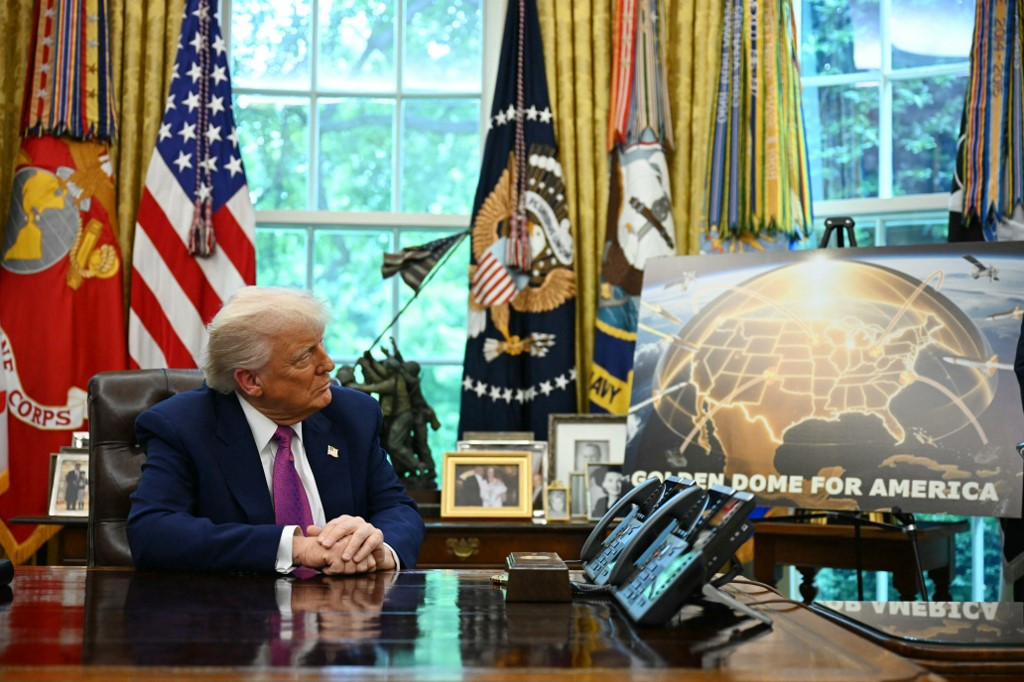
WASHINGTON, May 21, 2025 (BSS/AFP) - US President Donald Trump has announced
new details and initial funding for his "Golden Dome" missile shield system,
with geopolitical rival China accusing Washington on Wednesday of undermining
global stability.
Trump on Tuesday announced $25 billion earmarked for the project, which he
said could eventually cost a total of around $175 billion and would be
operational in about three years.
Beijing hit back Wednesday, denouncing Golden Dome as a threat to
international security and accusing the United States of fueling an arms
race.
"In the campaign I promised the American people I would build a cutting-edge
missile defense shield," Trump said at the White House on Tuesday.
"Today I am pleased to announce we have officially selected architecture for
this state-of-the-art system."
"Once fully constructed, the Golden Dome will be capable of intercepting
missiles even if they are launched from other sides of the world, and even if
they are launched from space," Trump said.
"This is very important for the success and even survival of our country."
He said US Space Force General Michael Guetlein will lead the effort, and
that Canada has expressed interest in being part of it as "they want to have
protection also."
While Trump put the total price at about $175 billion, the Congressional
Budget Office has estimated the cost of space-based interceptors to defeat a
limited number of intercontinental ballistic missiles at between $161 billion
and $542 billion over 20 years.
Golden Dome has more expansive goals, with Trump saying it "will deploy next-
generation technologies across the land, sea and space, including space-based
sensors and interceptors."
Pentagon chief Pete Hegseth, speaking alongside Trump, said the system is
aimed at protecting "the homeland from cruise missiles, ballistic missiles,
hypersonic missiles, drones, whether they're conventional or nuclear."
- China, Russia oppose Golden Dome -
The plan's Golden Dome name stems from Israel's Iron Dome air defense system
that has intercepted thousands of short-range rockets and other projectiles
since it went into operation in 2011.
The United States faces various missile threats from adversaries, but they
differ significantly from the short-range weapons that Israel's Iron Dome is
designed to counter.
The 2022 Missile Defense Review pointed to growing threats from China and
Russia.
Beijing is closing the gap with Washington when it comes to ballistic and
hypersonic missile technology, while Moscow is modernizing its
intercontinental-range missile systems and developing advanced precision
strike missiles, the document said.
It also said that the threat of drones -- which have played a key role in the
Ukraine war -- is likely to grow, and warned of the danger of ballistic
missiles from North Korea and Iran, as well as rocket and missile threats
from non-state actors.
Beijing on Wednesday expressed "serious concern" over the plan, saying it
undercuts "global strategic balance and stability."
"The United States puts its own interests first and is obsessed with seeking
its own absolute security, which violates the principle that no country's
security should come at the expense of others," foreign ministry spokeswoman
Mao Ning said at a regular briefing.
"(The plan) heightens the risk of space becoming a battlefield, fuels an arms
race, and undermines international security," Mao added.
China this month had already joined Russia in slamming the concept as "deeply
destabilizing".
It "explicitly provides for a significant strengthening of the arsenal for
conducting combat operations in space," said a statement published by the
Kremlin after talks between the two sides.
The United States has gained valuable real-world experience in defending
against missiles and drones in recent years.
In Ukraine, US systems have been used to counter advanced Russian missiles,
while American planes and warships helped defend Israel against Iranian
attacks last year and have repeatedly shot down missiles and drones launched
at ships by Yemen's Tehran-backed Huthi rebels.